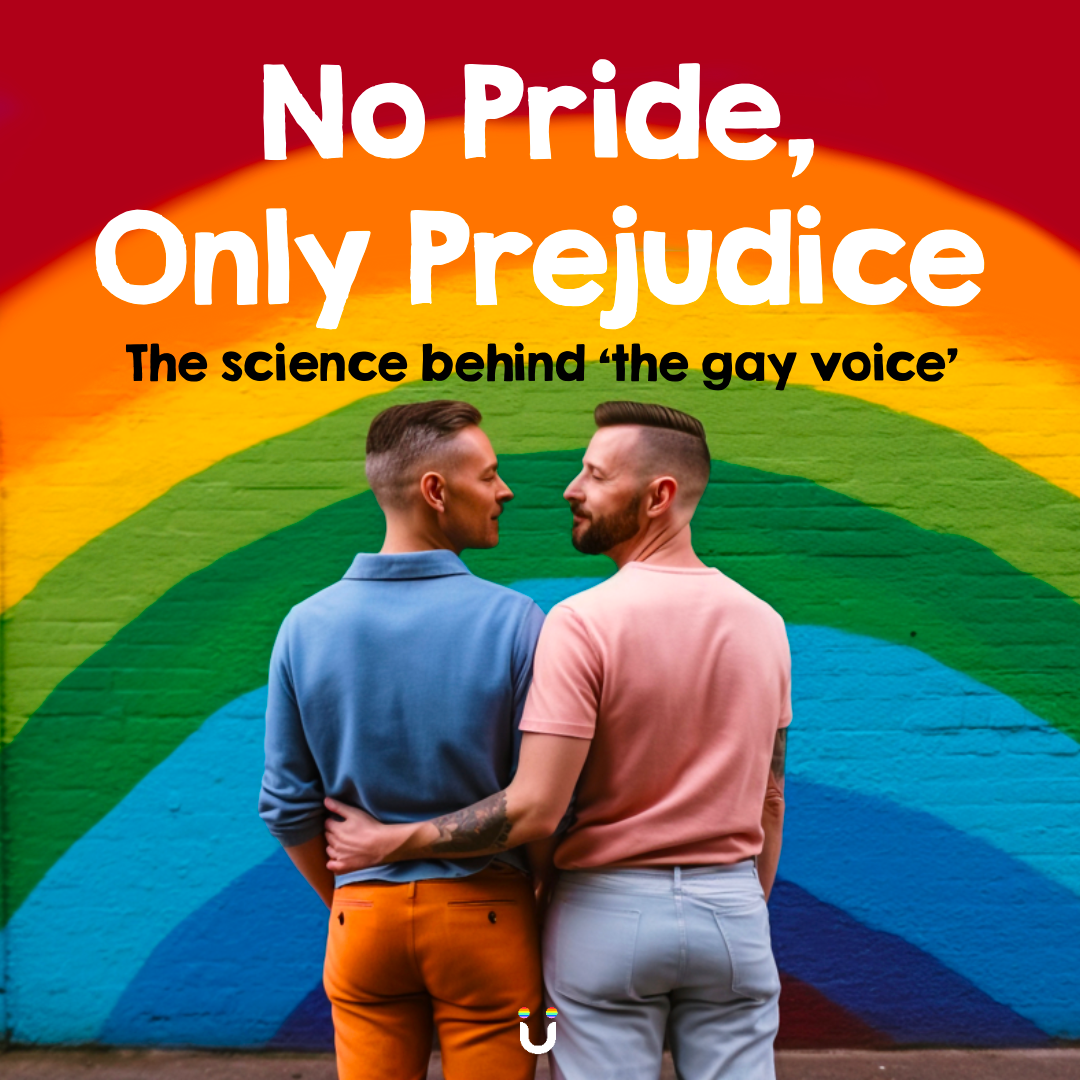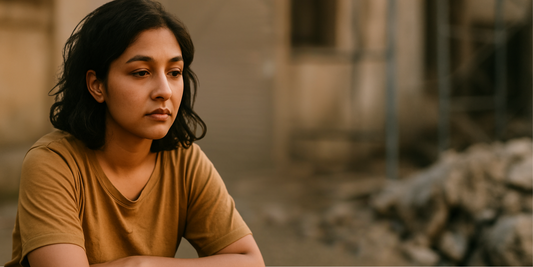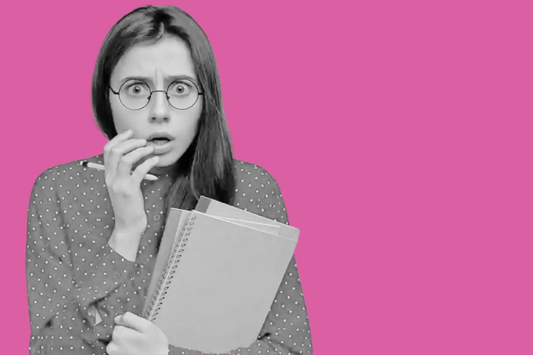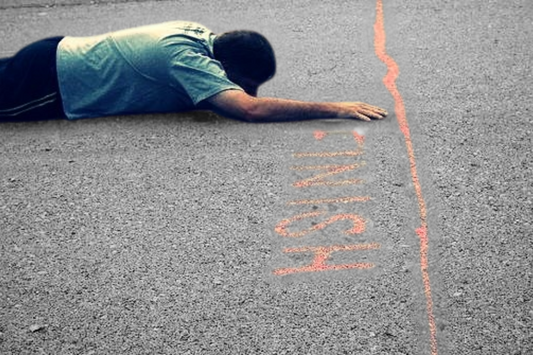No Pride, Only Prejudice: The Science Behind The 'Gay Voice'
Over the years, I realised I have had a lot of talents.
I can roll my tongue, impersonate a pigeon (my head tut is phenomenal), fly a kite without any help, and most importantly, lie my way through a resume even when I am asleep. It’s a lot for one person.
But faking a baritone is clearly not one of them.
I realised my voice was softer (read: more girly, for the masses and the misinformed) at a very early age. Being all of eight, I wasn’t great at pretending to be someone else (at least back then), and booming out like a blue whale wasn’t something we were taught in kindergarten. To avoid years of ridicule and subsequent bullying, I chose the only plausible solution.
Silence.
The road to masking my voice was not an easy one: I would reluctantly answer questions in the classroom (or avoided the teacher’s eye), never yelled out to friends across the road (either out of surprise, joy or an incessant need to go slap them across their faces), and would pretend to be ‘shy’ in front of people I didn’t know. It’s lovely how many things you can pass off; when you tell people that you are an introvert.
But there would be times when I’d forget, and my shrill voice would ricochet out like a distress call, in multiple high-octaves and increasing pitches - bringing with it a deluge of hushed whispers; empty sniggers from emptier souls.
‘Why do you sound so nasal?’ my friends would laugh, and I’d retort back with a stiff-lipped jab about my ‘respiratory problems that they’d never understand’. That would silence them all, up until I changed schools, and changed bullies along with them. I’d come up with new reasons every single time, but they’d all get shot down (or laughed at) in a week or two.
Over the next two decades, I grew up – and grew out of these insecurities (and my shrill, pre-pubescent voice). I’d learnt to adapt the way I spoke to whoever I was speaking to, and I used it like a shield.
I’d conveniently gruff up with a North Indian accent (read: hypermasculine on steroids) while speaking to a male colleague, and soften up with a breathier, breezier Bombay undercurrent while chatting up female acquaintances. I reserved my ‘it’s-too-loud-in-here-to-hear-you’ blur solely for my mother. Only my close friends got the real version of me. Highly excitable.
But yet, my voice was - and is - still…the same?
To be really honest, it sounds even worse on the phone, only because I suffer from this recurring nightmare where I have to hear my voice on an answering machine on loop - which only makes it an everyday affair with telemarketers.
‘Hello, madam? Can we interest you in a home loan…’
‘Dear miss! Vodafone has an exciting new offer for you….’
‘Yes, ma’am. Do you want to try our double cheese burst special with that?’
I’d gruffly tell them I was a man, and hang up.
Truth be told, I hated the way my voice sounds, and I absolutely hate that I hated it, and I hated the way that a voice like mine was usually hated. It’s a hamster-cycle of hate, only here the proverbial hamster (read: me) was running on a wheel of increasing decibels. It’s all very sad, isn’t it?
It’s the same as shrinking away from anything that is even remotely effeminate - including pink linen shirts, Cosmopolitans and peroxide hair - but what are we so afraid of? To sound like ourselves, or to be ourselves? Ask any queer man, and he’ll tell you this: a major part of the gay life is trying to act/sound gay enough in public so that other gay people notice you, but not gay enough to attract hate from aggressively homophobic straight men. How do I know this? Because I use the same voice with my friends’ husbands, my gym trainer and the occasional Uber driver.
Generations of (gay) men have cleared their throats, deepened their voices and raised their walls so that they could reek of everyone’s favourite perfume.
‘Toxic Masculinity’, by you. I wore it proudly myself.
And then everything changed last year.
I was meeting a few friends for a reunion halfway across town. It was a champagne-fuelled brunch, and everyone (including me) was buzzed and giggling, as people at champagne-fueled brunches are wont to be. There were kids running around and playing with their tablets, like kids are wont to do. In the midst of an extremely ribald joke that I am not very proud of, one of my friend’s kids tugged at my trousers. It was a little boy in blue, holding a tablet in one hand, and a Transformer doll action figurine in the other.
‘Why does your voice sound like a girl?’ the little child asked me curiously. Side note: I’ve never really liked little children – they are cocky, brash and solely rely on their cuteness to get away with inappropriate things (sort of like the quintessential fuckboi, only three decades younger). Call it an occupational hazard of being a gay person.
But yet, it had come back, the fear - it had followed me all the way out of every classroom and playground - and it came back to haunt me almost two whole decades later. I felt like I was in school all over again. My facades went up, just like my voice had a few moments ago.
‘Because that’s how my voice sounds when I am drunk,’ I said to him shamelessly, ‘It’s my happy voice! Your mum has one as well!’ (sue me for being scathing.) We all laughed aloud, because it was all in good humour, but the mother avoided me for the rest of the evening. I compensated for her absence with three extra mimosas (Another side note: The mother wasn’t that close of a friend of mine, so the jabs were all well-founded.)
But that’s when it struck me. People might say it is not, but my voice is gay (but not in the derogatory slur kind of way, but in a more empowering sort of way), just like the rest of me.
Let’s get it straight. Do you know what you sound like when you laugh at someone for having ‘the’ gay voice?
An asshole. Just like the fact that people come in all shapes and sizes, voices come in multiple octaves and tones. Some men sound like a double measure of single malt, some men sound like fingernails on a blackboard. Some men sound like twittering birds, some men sound like mean tweets by trolls. We are all born with our vocal chords, just like we are born with our sexuality.
And it’s high time we learn to deal with it.
At least I plan to. If it’s a dead giveaway that I am gay, so what? I think being a homosexual is pretty cool. I’ve got too much to say, and that is exactly why I won’t stop talking.
And neither should you.





